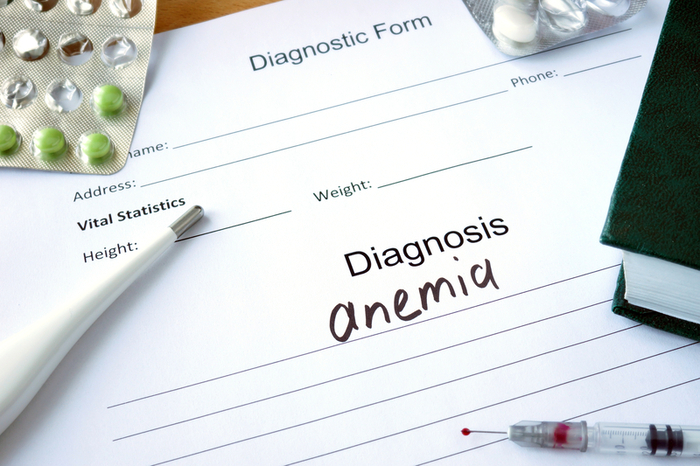- Calls to this hotline are currently being directed to Within Health, Fay or Eating Disorder Solutions
- Representatives are standing by 24/7 to help answer your questions
- All calls are confidential and HIPAA compliant
- There is no obligation or cost to call
- Eating Disorder Hope does not receive any commissions or fees dependent upon which provider you select
- Additional treatment providers are located on our directory or samhsa.gov
Can Anorexia Cause Anemia?

Anorexia Nervosa is an eating disorder characterized by extreme restriction of nutritional intake. No bodily system can function as intended without the vitamins and nutrients that proper food and hydration provide. As such, the impact restriction has on the physical body, and the long-term consequences if left untreated, are severe.
Anorexia and the Cardiovascular System
One bodily system impacted by restrictive eating behaviors is the circulatory/cardiovascular system which describes the vast system that carries blood and lymph throughout the body.
This system includes the heart, blood, and blood vessels such as arteries, veins, and capillaries [1]. Through these systems, nutrients are transported to the body’s cells and waste is transported from the body’s cells [2].
Anorexia Nervosa behaviors can lead to “Cachexia and malnutrition [which are] are serious complications of numerous malignant and non-malignant diseases like chronic obstructive lung disease, chronic kidney disease, and severe heart failure [3].”
Other impacts of restrictive eating and malnourishment on the cardiovascular system are “causes can be due to decreased intake, increased loss of nutrients, increased metabolic rate and cytokine dysfunction involving tumor necrosis factor-alpha (TNF-α), cortisol, epinephrine, renin as well as aldosterone. [3].”
Anorexia Nervosa and Anemia
Anemia is an additional cardiovascular consequence of malnourishment and is “a condition marked by a deficiency of red blood cells or of hemoglobin in the blood, resulting in pallor and weariness [4].” Anemia leads to reduced oxygen-flow to the body’s organs and can also lead to dizziness, fatigue, shortness of breath, a fast heartbeat, and/or lightheadedness.
Anemia puts one at an increased risk for coronary heart disease, hypertension, and other cardiac complications.
21 to 39% of those that struggle with anorexia nervosa are diagnosed with anemia [4]. This relationship is attributed to the nutritional deficiencies that result due to food and fluid restriction.
One study looked deeper into the relationship between anemia and anorexia nervosa and specified 5 anorexia nervosa related causes of anemia:
- Bone Marrow Malfunction: This is believed to be the first cause of anemia in individuals with anorexia nervosa and is present in 39% of anorexia nervosa patients.
- Deprivation: Anemia due to deprivation is possible but is less common than most people think. This anemia can involve iron, vitamin B12, or folate deprivation.
- Hemolysis: This is the rupture or destruction of red blood cells and can occur in refeeding syndrome.
- Loss of Hemoglobin
- Inflammation: This is often misdiagnosed as iron deficiency [3].

Anemia and Anorexia Recovery
While there is no doubt that anemia is a likely and concerning side effect of anorexia nervosa, there is hope, as one study notes that hematological impacts of malnutrition are typically resolved “with nutritional rehabilitation after a variable length of time [5].”
Another study specifies that anemia in individuals with anorexia nervosa “presents as a moderate, transitory, and asymptomatic anemia and would eventually correct by itself with proper care for AN, particularly with appropriate and progressive refeeding [3].”
It is always concerning when the body does not receive the nutrients and vitamins needed for it to function appropriately. The body is an incredible machine, however, it needs nourishment in order to run. The incredible properties of the human body cannot occur at the same time as restrictive food and fluid intake.
It is certainly hopeful that hematological complications of anorexia nervosa, such as anemia, can be resolved with refeeding, however, this does not mean there are no long-term impacts on the body.
For the body to perform optimally and bring one through a lifetime of fulfillment, periods of restriction and malnourishment should be avoided completely, whether through severe anorexic restriction or even cutting out food groups or types through dieting.
Your body is a wonderful gift of a machine, despite mental health struggles, do your best to honor this through taking care of it.
Resources
[1] Sherrel, Z. (2021). What to know about the cardiovascular system. Medical News Today. Retrieved from https://www.medicalnewstoday.com/articles/cardiovascular-system. [2] Unknown (2020). Nutrients are essential for organ function. American Public University. Retrieved from https://med.libretexts.org/Courses/American_Public_University/APUS%3A_An_Introduction_to_Nutrition_(Byerley)/Text/02%3A_Gastrointestinal_Tract/2.04%3A_Nutrients_Are_Essential_for_Organ_Function. [3] Amare, H., Hamza, L., Asefa, H. (2015). Malnutrition and associated factors among heart failure on follow-up at Jimma University specialized hospital Ethiopia. BMC Cardiovascular Disorders. [4] Mamou, G., et al. (2016). Anemia in anorexia nervosa. Journal of Human Nutrition and Food Science, 4:1. [5] Fillipo, E. D., et al. (2016). Hematological complications in anorexia nervosa. European Journal of Clinical Nutrition, 70:11.The opinions and views of our guest contributors are shared to provide a broad perspective on eating disorders. These are not necessarily the views of Eating Disorder Hope, but an effort to offer a discussion of various issues by different concerned individuals.
We at Eating Disorder Hope understand that eating disorders result from a combination of environmental and genetic factors. If you or a loved one are suffering from an eating disorder, please know that there is hope for you, and seek immediate professional help.
Published March 21, 2022 on EatingDisorderHope.com
Reviewed & Approved on March 21, 2022, by Jacquelyn Ekern MS, LPC
Margot Rittenhouse, MS, PLPC, NCC is a therapist who is passionate about providing mental health support to all in need and has worked with clients with substance abuse issues, eating disorders, domestic violence victims, and offenders, and severely mentally ill youth.
As a freelance writer for Eating Disorder Hope and Addiction Hope and a mentor with MentorConnect, Margot is a passionate eating disorder advocate, committed to de-stigmatizing these illnesses while showing support for those struggling through mentoring, writing, and volunteering. Margot has a Master’s of Science in Clinical Mental Health Counseling from Johns Hopkins University.

